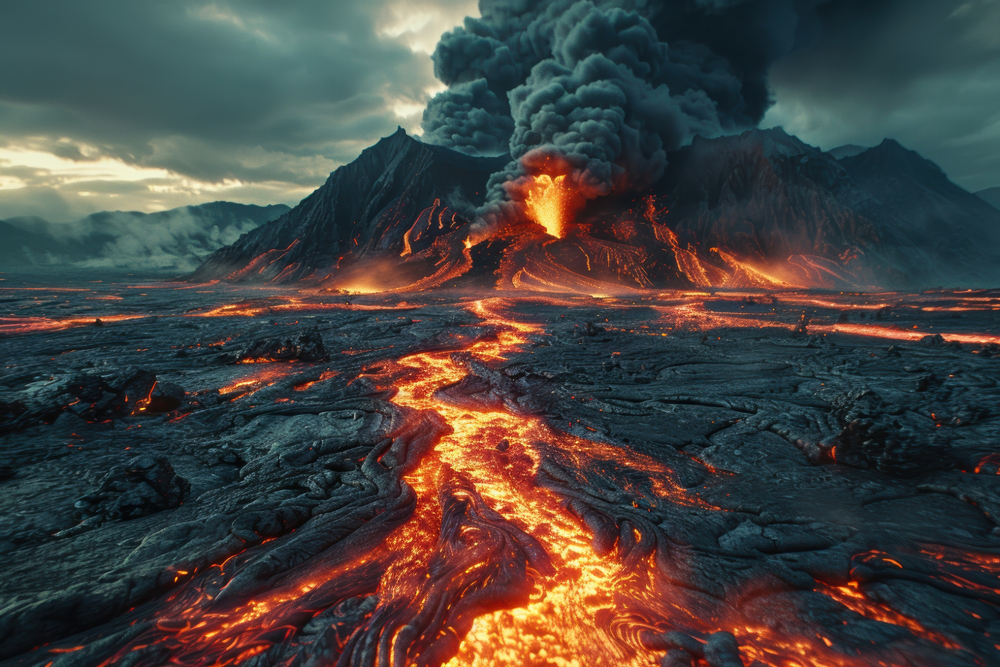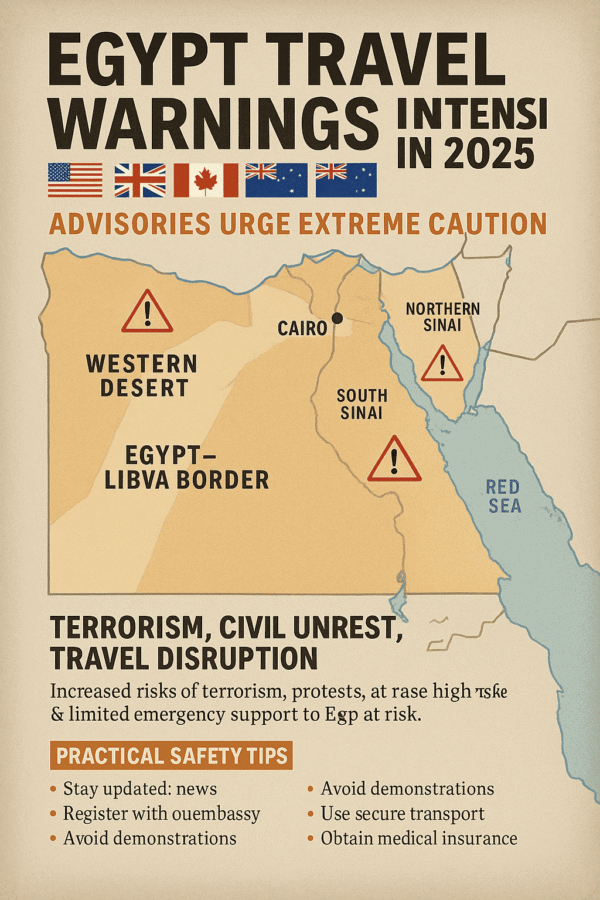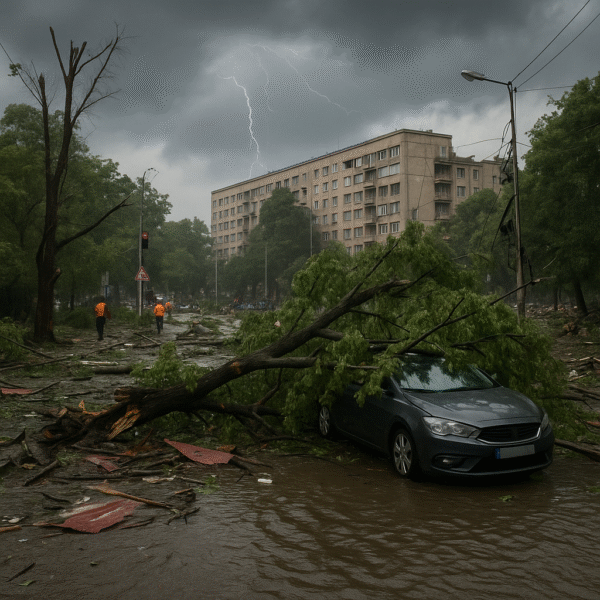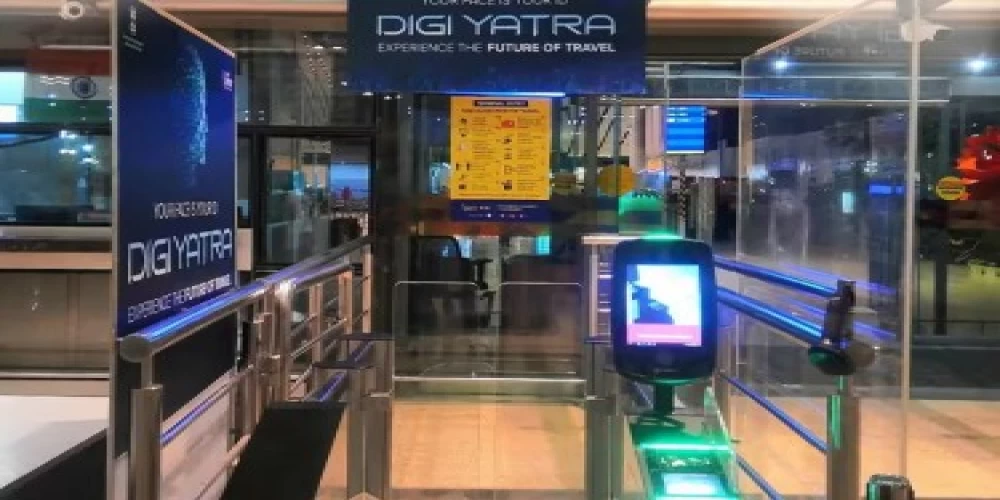In a rare coordinated response to escalating regional threats, the United States, United Kingdom, Canada, Australia, and New Zealand have issued urgent travel warnings for Egypt, advising citizens to reconsider or avoid non-essential travel due to the growing risk of terrorism, civil unrest, and limited emergency support.
The advisories follow months of increased militant activity in the Sinai Peninsula, mounting instability in the Western Desert, and sporadic episodes of violence in major cities such as Cairo and Alexandria. As the security landscape continues to deteriorate, these governments emphasize the need for heightened vigilance and thorough travel planning for anyone considering visiting Egypt in 2025.
Key Security Concerns in Egypt Highlighted by Multiple Governments
1. Terrorist Activity in the Sinai Peninsula
The North Sinai Governorate remains one of the most dangerous zones in the country. Extremist groups, including Islamic State affiliates, continue to conduct roadside bombings, ambushes, and targeted attacks on security forces and civilians. All five countries have urged their citizens to avoid all travel to this region.
2. Western Desert and Egypt–Libya Border
The Western Desert, particularly near the Libyan border, is a zone of increased military activity and criminal operations. Smuggling, arms trafficking, and kidnapping incidents have surged, leading to warnings from the UK Foreign Office and Australian DFAT to avoid these areas altogether.
3. Urban Unrest in Cairo and Alexandria
While Egypt’s capital city remains a major tourist attraction, civil unrest and political demonstrations pose significant risks. Governments caution travelers to avoid large gatherings, as protests can escalate rapidly and are often met with a heavy-handed security response. There have been reports of arbitrary arrests of foreigners near protest zones, especially in central Cairo.
4. Threats to Tourist Resorts
Even popular Red Sea destinations like Sharm El Sheikh and Hurghada, while relatively more secure, are not immune to threats. The UK, Canada, and Australia recommend remaining within well-secured resorts, avoiding remote areas, and staying updated with local advisories.
Travel Disruption and Healthcare Access Concerns
In addition to threats of violence, travelers are warned about limited emergency services across the country, especially in rural and conflict-prone areas. Access to advanced medical care is constrained, and the quality of public health infrastructure varies widely. Governments urge travelers to purchase comprehensive travel insurance, including emergency medical evacuation.
Flight delays, checkpoint closures, and curfews may also affect travel schedules with little warning. The U.S. Embassy in Cairo and other diplomatic missions advise travelers to register with their consular services to receive real-time security updates.
Breakdown of Country-Specific Travel Advice
| Country | Key Advisories |
|---|---|
| United States | Avoid North/Central Sinai; monitor protests in Cairo; limited medical access. |
| Australia | Avoid Sinai and Western Desert; use secured resorts; follow local security updates. |
| Canada | Avoid North Sinai, Western Desert; reconsider travel to North South Sinai. |
| New Zealand | Avoid Northern Sinai and border zones; secure insurance; use reliable transport. |
| United Kingdom | Complete travel ban to North Sinai and Libyan border; avoid northern South Sinai. |
Practical Safety Tips for Travelers to Egypt in 2025
Even with restrictions, travelers who must visit Egypt for essential reasons should adhere to strict safety guidelines:
- Stay Updated: Follow local news and monitor travel alerts from your embassy.
- Register with Embassy: Enroll in travel registration programs such as STEP (U.S.) or ROCA (Canada) to receive alerts.
- Avoid High-Risk Zones: Do not venture into North Sinai, the Western Desert, or border regions without proper authorization.
- Health Preparation: Get vaccinations for polio, typhoid, and hepatitis; carry sufficient medical supplies.
- Avoid Demonstrations: Steer clear of protests, political rallies, or any large public gatherings.
- Respect Local Laws: Avoid filming or photographing security forces or infrastructure. Obey curfews and travel restrictions.
- Use Secure Transport: Use licensed taxis, private transport, or apps like Uber. Avoid public transport in conflict areas.
- Have Emergency Contacts Ready: Know local emergency numbers (Police: 122, Ambulance: 123) and embassy contacts.
Egypt’s Complex Reality: A Tourism Icon in Crisis
Despite the warnings, Egypt remains one of the world’s most historic and culturally rich travel destinations. The Pyramids of Giza, Luxor’s Valley of the Kings, and the Red Sea resorts continue to attract interest—but the evolving security threats cannot be ignored.
Tourism accounts for nearly 12% of Egypt’s GDP, according to the Egyptian Ministry of Tourism, and any disruption has significant economic implications. However, security remains a top priority, with Egypt’s government increasing patrols, introducing travel monitoring systems, and partnering with international agencies to address risks.
Still, foreign ministries stress that the situation remains fluid, and travelers must take full responsibility for understanding and mitigating the risks.
Conclusion: Is It Safe to Travel to Egypt in 2025?
While Egypt remains on many travelers’ bucket lists, the joint travel advisories issued by the U.S., UK, Australia, Canada, and New Zealand underscore a stark reality: the region is facing unprecedented volatility, especially in Sinai, border regions, and urban protest zones.
Those considering travel to Egypt in 2025 are strongly encouraged to:
- Reconsider non-essential travel.
- Stay within secured, well-patrolled tourist zones.
- Register with their embassies and purchase robust insurance.
- Follow all safety protocols and avoid spontaneous activities.
For now, caution is not just advised—it is essential.
Let me know if you’d like a visual alert or infographic summarizing key advisory areas and safety tips for traveler awareness.
For more travel news like this, keep reading Global Travel Wire
















